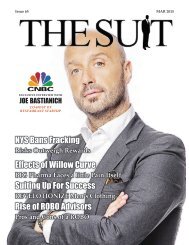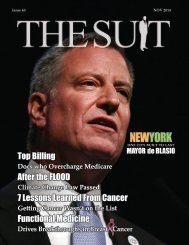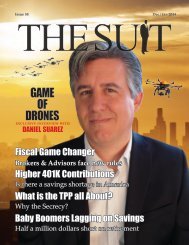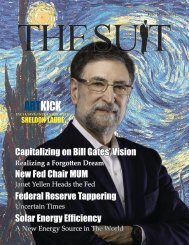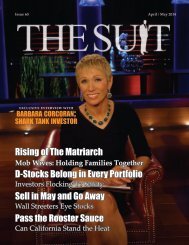o_19grqq7snim9mn019q11f7ds26a.pdf
Marcus Lemonis, a serial entrepreneur and host of the show “The Profit” on CNBC, is a true survivor in the corporate world. The native-born Lebanese business man endured the chaos of a civil war in Beirut and eventually moved to Miami. Lemonis was exposed to the automotive industry throughout his upbringing - his grandfather owning two of the largest Chevrolet dealerships in the United States and Lee Iacocca serving as the family friend and later mentor to Lemonis. On page 12, we conducted an interview with “Profit” host Marcus Lemonis, who offers struggling small businesses capital investment and his expertise in exchange for an ownership stake in the company. In the latter part of the magazine, we interviewed countless wealth advisors during these tough economic times. We recognize that some of the changes in 2013 and 2014 require relevance for financial planners. Therefore, the financial industry continues to push for more realistic standards and reforms.
Marcus Lemonis, a serial entrepreneur and host of the show “The Profit” on CNBC, is a true survivor in the corporate world. The native-born Lebanese business man endured the chaos of a civil war in Beirut and eventually moved to Miami. Lemonis was exposed to the automotive industry throughout his upbringing - his grandfather owning two of the largest Chevrolet dealerships in the United States and Lee Iacocca serving as the family friend and later mentor to Lemonis. On page 12, we conducted an interview with “Profit” host Marcus Lemonis, who offers struggling small businesses capital investment and his expertise in exchange for an ownership stake in the company. In the latter part of the magazine, we interviewed countless wealth advisors during these tough economic times. We recognize that some of the changes in 2013 and 2014 require relevance for financial planners. Therefore, the financial industry continues to push for more realistic standards and reforms.
Create successful ePaper yourself
Turn your PDF publications into a flip-book with our unique Google optimized e-Paper software.
y david stein<br />
DANGER<br />
On The Way Down<br />
According to an “NBC World News” report, significantly more mountain<br />
climbers – including the well-trained Sherpa guides who accompany them –<br />
die on the descent from the peak of Mount Everest than do on the ascent to<br />
conquer the most-sought after mountain experience on planet Earth.<br />
It’s a fact that applies to financial<br />
mountain climbing as well, according<br />
to Les Howard, a partner with<br />
Legacy Financial Partners in Brookings,<br />
South Dakota and an owner via the<br />
Ameriprise Financial franchise network.<br />
“In fact, the mountain climbing analogy<br />
is one that Ameriprise representatives<br />
frequently utilize in training advisers<br />
and informing clients of potential pitfalls<br />
when the drawdown period of retirement<br />
planning begins,” Howard explains.<br />
Mountain climbing experts will tell you<br />
that climbers are more aware and exercise<br />
greater caution on the way up in<br />
anticipation of accomplishing their goal.<br />
As they descend the mountain, they are<br />
tired and as they pass through various<br />
climatic zones with varying levels of oxygen<br />
and barometric pressure, their brains<br />
can swell, causing lack of coordination.<br />
“I’ve been the guy who helps people<br />
get to the top of the mountain by investing<br />
wisely,” Howard said, noting that<br />
now many of his clients have reached<br />
their mountain top goals with retirement<br />
from their working years and are ready<br />
to head down to lush valleys filled with<br />
flowing streams. Yet, determining the<br />
pace at which they should descend (or<br />
spend down their funds) is as challenging<br />
as avoiding those deadly crevices<br />
that swallow far too many climbers. It is<br />
part of why he chose to align his longtime<br />
practice with Ameriprise Financial.<br />
“Ameriprise is known as a planning firm.<br />
They are very strong in this area and it<br />
had a lot to do with me joining them so<br />
that I could build my skills in this area to<br />
assist my clients.”<br />
Howard has worked in financial planning<br />
services since 1987, after hanging<br />
up his work gloves as a rancher/farmer in<br />
northeast South Dakota. A downturn in<br />
the economy nearly wiped him out financially,<br />
so he went to college, and at age<br />
31, Howard earned a bachelor’s degree in<br />
economics.<br />
Between that and his current position<br />
representing the services of Ameriprise,<br />
Howard worked for the Investment Centers<br />
of America at a bank in Aberdeen,<br />
South Dakota, and then on to state government,<br />
marketing a supplemental retirement<br />
plan for state workers in the<br />
Mount Rushmore State. That job put<br />
him in front of many of the state’s key<br />
decision-makers, who noticed his capabilities.<br />
He was offered a position in the<br />
governor’s budget office as an analyst<br />
and four years later, he was promoted to<br />
division director.<br />
In 1994, via an association with Prudential,<br />
he returned to banking and financial<br />
services, opening his own firm called<br />
Howard and Associates, in Pierre, the<br />
state’s capital. In October 2005, Howard<br />
returned to Brookings where he went to<br />
college at South Dakota State University.<br />
A series of name changes to the firm<br />
THE SUIT MAGAZINE - JULY 2014




